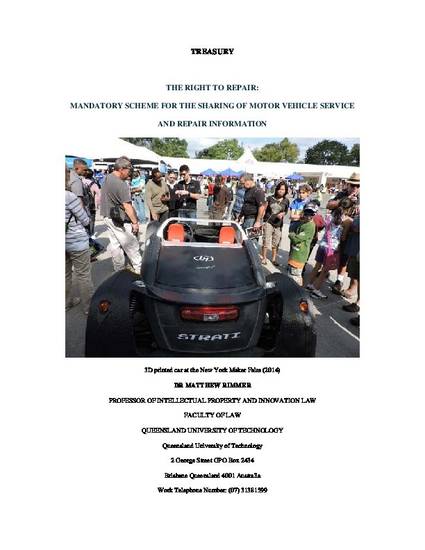
Other
The Right to Repair: Mandatory Scheme for the Sharing of Motor Vehicle Service and Repair Information
(2019)
Abstract
Treasury has proposed ‘the design of a mandatory scheme for access to motor vehicle service and repair information’. The intention is that ‘This scheme would provide a level playing field in the sector and allow consumers to have their vehicles safely repaired by the repairer of their choice.’ Treasury argues: ‘The purpose of this consultation is to gauge the suitability of possible elements of a mandatory scheme for the sharing of motor vehicle service and repair information and the establishment of a Service and Repair Information Sharing Advisory Committee’. Treasury maintains: ‘Subject to the outcome of consultation on these elements, the Government intends to implement a scheme in 2019.’ This submission argues that the response of Treasury is inadequate and insufficient. Treasury underestimates the nature of the problem – by merely focusing upon certain parts of motor vehicle service and repair. The problem of the right of repair is a much more fundamental and general problem, which cuts across a wide range of fields of goods and services. Treasury also provides an inadequate solution for the problems in respect of repair. The code of conduct seems a rather nominal response. Treasury need to consider larger questions about the right of repair under consumer law, intellectual property, and sustainable development. It is argued that the Australian Government needs to provide for a stronger recognition of the right of repair across a range of legal disciplines.
Recommendation 1
Treasury’s proposed code of conduct in respect of repair information is inadequate because it is limited to parts of the motor vehicle industry. Issues over the right of repair have been raised across a wide range of fields of industry and business – not just parts of the motor vehicle industry. As such, Treasury’s proposed code of conduct in respect of repair information seems only a shadow solution to the problems that it has identified.
Recommendation 2
Treasury also proposes the establishment of a Service and Repair Information Sharing Advisory Committee. The membership of the Committee, though, is entirely made up of representatives of different parts of the motor vehicle industry. There is no representative on this Committee, which would represent the larger public interest in respect of consumer rights and competition policy.
Recommendation 3
Treasury’s proposed code of conduct in respect of repair information does not resolve the larger questions about consumer rights and competition policy in the motor vehicle industry. In many ways, the code of conduct seems to entrench the status quo – wherein it is difficult to engage in repairs without the permission of the manufacturer. Self-regulatory codes of conduct have not necessarily been effective in other fields of industry.
Recommendation 4
Treasury’s proposed code of conduct in respect of repair information is likely to be ineffective because it does not properly include intellectual property. The code of conduct specifically excludes trade secrets, intellectual property of the manufacturer, and commercially sensitive information. Given the broad scope of intellectual property, this means that intellectual property owners can largely ignore the code of conduct in respect of motor vehicle information.
Recommendation 5
Australian copyright law would benefit from the introduction a defence of fair use – which would conceivably include a right of repair. Otherwise, there should be a new defence of fair dealing – dealing with the right of repair.
Recommendation 6
The technological protection measures regime in Australia needs to have proper exceptions allowing for the right of repair.
Recommendation 7
Unlike some of the other Australian intellectual property regimes, Australian designs law has a defence in respect of a right of repair. The scope of this defence has been recently considered in the case of GM Global Technology Operations LLC v S.S.S. Auto Parts Pty Ltd [2019] FCA 97 (11 February 2019).
Recommendation 8
Australian patent law recognises a defence of experimental use. However, it is not clear that the defence extends to repairs. The compulsory licensing regime remains unwieldy at the moment – but in exceptional circumstances could be used to provide access to inventions for the purposes of repair on competition grounds.
Recommendation 9
Australia provides for civil remedies in respect of trade secrets, as well as criminal offence in respect of violation of trade secrets by foreign principals. However, the nature and scope of defences for trade secrets remains unclear. There has been debate as to whether there is a general interest defence (as espoused by Kirby J) or a narrow defence related to exposing wrongdoing and iniquity (as recommended by Gummow J). In this context, there is currently a lack of clarity as to whether using trade secrets for the purposes of repair would be allowable.
Recommendation 10
Australia should reform the Product Stewardship Act 2011 (Cth) in order to promote the right to repair and a circular economy.
Recommendation 11
A number of other jurisdictions in the United States, Canada, the United Kingdom, and the European Union have developed much more advanced plans than Australia to address a right of repair. Australia needs to do more to keep up with its contemporaries on the right of repair.
Recommendation 12
There is a need to recognise a right of repair in Australia in order to help implement Sustainable Development Goal No. 12, which is focused on responsible production and consumption.
Keywords
- The right of repair,
- consumer law,
- intellectual property,
- sustainable development,
- the circular economy,
- copyright law,
- technological protection measures,
- designs law,
- patent law,
- trade secrets
Disciplines
Publication Date
March 12, 2019
DOI
https://treasury.gov.au/consultation/c2019-t358022/
Comments
Treasury Inquiry - https://treasury.gov.au/consultation/c2019-t358022/
Mandatory scheme for the sharing of motor vehicle service and repair information
The Government has committed to supporting appropriate commercial dealing and competition in the new car retail supply chain for the benefit of both small businesses and consumers. This includes considering the design of a mandatory scheme for access to motor vehicle service and repair information. This scheme would provide a level playing field in the sector and allow consumers to have their vehicles safely repaired by the repairer of their choice. The purpose of this consultation is to gauge the suitability of possible elements of a mandatory scheme for the sharing of motor vehicle service and repair information and the establishment of a Service and Repair Information Sharing Advisory Committee. Subject to the outcome of consultation on these elements, the Government intends to implement a scheme in 2019. This implementation would include a further period of public consultation on the full detail of provisions to be included in the scheme.
Citation Information
Matthew Rimmer. "The Right to Repair: Mandatory Scheme for the Sharing of Motor Vehicle Service and Repair Information" (2019) Available at: http://works.bepress.com/matthew_rimmer/338/
